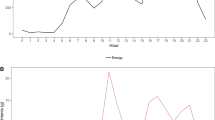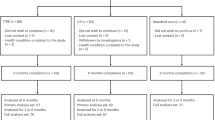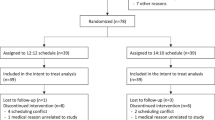Abstract
Background/Objectives
We assessed the association between the timing of meals across the day with diet composition and metabolic parameters in patients with type-2 diabetes (T2D).
Subjects/Methods
Eighty adults (55.2 ± 6.8 years, 45% males) patients with T2D (without insulin therapy) were included. Three non-consecutive dietary records assessed food intake. The onset time of each consumed meal/beverage was identified and assigned to one of three periods of the day: Period 1 (P1, 06:00–11:59 h), Period 2 (P2, 12:00–17:59 h), and Period 3 (P3, 18:00–00:30 h).
Results
Energy intake in P1 was lower compared to P2 and P3 (22.8 ± 7.9%, 37.5 ± 9.6%, and 39.7 ± 9.9%, respectively, P < 0.001). The same pattern was found for both total protein and fat intake, but carbohydrate intake was similar among periods. Patients with greater daily energy intake (as % of total energy) in P3 showed increased total food consumption, total energy, protein, and fat intake (all P < 0.05). The opposite pattern was observed in patients with greater daily energy intake in P1 (all P < 0.05). Regression analysis showed that daily energy intake was significantly reduced when a higher proportion of carbohydrates was eaten in P1 (vs. P3, P < 0.04).
Conclusion
Increased energy intake late during the day is related to increased total food and daily energy intake in patients with T2D. A greater proportion of total carbohydrates eaten early during the day relates to lower total energy intake. Our results suggest that earlier food intake may be a nutritional tool for dietary and metabolic control in these patients.
This is a preview of subscription content, access via your institution
Access options
Subscribe to this journal
Receive 12 print issues and online access
$259.00 per year
only $21.58 per issue
Buy this article
- Purchase on Springer Link
- Instant access to full article PDF
Prices may be subject to local taxes which are calculated during checkout


Similar content being viewed by others
Data availability
Data are available from the corresponding author on reasonable request.
References
Almoosawi S, Winter J, Prynne CJ, Hardy R, Stephen AM. Daily profiles of energy and nutrient intakes: are eating profiles changing over time? Eur J Clin Nutr. 2012;66:678–86.
Oda H. Chrononutrition. J Nutr Sci Vitaminol. 2015;61:S92–4.
Tahara Y, Shibata S. Chronobiology and nutrition. Neuroscience. 2013;253:78–88.
Tavares LF, Fonseca SC, Garcia Rosa ML, Yokoo EM. Relationship between ultra-processed foods and metabolic syndrome in adolescents from a Brazilian Family Doctor Program. Public Health Nutr. 2012;15:82–87.
Martínez Steele E, Juul F, Neri D, Rauber F, Monteiro CA. Dietary share of ultra-processed foods and metabolic syndrome in the US adult population. Prev Med (Balt). 2019;125:40–48.
Corbalán-Tutau MD, Gómez-Abellán P, Madrid JA, Canteras M, Ordovás JM, Garaulet M. Toward a chronobiological characterization of obesity and metabolic syndrome in clinical practice. Clin Nutr. 2015;34:477–83.
Bray MS, Tsai JY, Villegas-Montoya C, Boland BB, Blasier Z, Egbejimi O, et al. Time-of-day-dependent dietary fat consumption influences multiple cardiometabolic syndrome parameters in mice. Int J Obes. 2010;34:1589–98.
Arble DM, Bass J, Laposky AD, Vitaterna MH, Turek FW. Circadian timing of food intake contributes to weight gain. Obes (Silver Spring). 2009;17:2100–2.
Almoosawi S, Prynne CJ, Hardy R, Stephen AM. Time-of-day of energy intake: association with hypertension and blood pressure 10 years later in the 1946 British Birth Cohort. J Hypertens. 2013;31:882–92.
Baron KG, Reid KJ, Kern AS, Zee PC. Role of sleep timing in caloric intake and BMI. Obes (Silver Spring). 2011;19:1374–81.
Baron KG, Reid KJ, Horn LV, Zee PC. Contribution of evening macronutrient intake to total caloric intake and body mass index. Appetite. 2013;60:246–51.
Jakubowicz D, Barnea M, Wainstein J, Froy O. High Caloric intake at breakfast vs. dinner differentially influences weight loss of overweight and obese women. Obes (Silver Spring). 2013;21:2504–12.
Jamshed H, Beyl RA, Manna DLD, Yang ES, Ravussin E, Peterson CM. Early time-restricted feeding improves 24-hour glucose levels and affects markers of the circadian clock, aging, and autophagy in humans. Nutrients. 2019;11:1234.
Chen J-H, Lu LW, Ge Q, Feng D, Yu J, Liu B et al. Missing puzzle pieces of time-restricted-eating (TRE) as a long-term weight-loss strategy in overweight and obese people? A systematic review and meta-analysis of randomized controlled trials. Crit Rev Food Sci Nutr. 2021;1–17.
Henry CJ, Kaur B, Quek RYC. Chrononutrition in the management of diabetes. Nutr Diabetes. 2020;10:6.
Bo S, Musso G, Beccuti G, Fadda M, Fedele D, Gambino R, et al. Consuming More of Daily Caloric Intake at Dinner Predisposes to Obesity. A 6-Year Population-Based Prospective Cohort Study. PLoS One. 2014;9:e108467.
Almoosawi S, Prynne CJ, Hardy R, Stephen AM. Diurnal eating rhythms: association with long-term development of diabetes in the 1946 British birth cohort. Nutr Metab Cardiovasc Dis. 2013;23:1025–30.
Jakubowicz D, Wainstein J, Ahren B, Bar-Dayan Y, Landau Z, Rabinovitz HR, et al. High-energy breakfast with low-energy dinner decreases overall daily hyperglycaemia in type 2 diabetic patients: a randomised clinical trial. Diabetologia. 2015;58:912–9.
Jakubowicz D, Wainstein J, Tsameret S, Landau Z. Role of High Energy Breakfast “Big Breakfast Diet” in Clock Gene Regulation of Postprandial Hyperglycemia and Weight Loss in Type 2 Diabetes. Nutr. 2021;13. https://doi.org/10.3390/nu13051558.
World Health Organization. Waist Circumference and Waist-Hip Ratio: Report of a WHO Expert Consultation. Geneva, 8–11 December 2008. Geneva, 2011 https://doi.org/10.1038/ejcn.2009.139.
Jebb SA. Measurement of soft tissue composition by dual energy X-ray absorptiometry. Br J Nutr. 1997;77:151–63.
Harris JA, Benedict FJ. A biometric study of basal metabolism in man. Carnegie Institute of Washington: Washington DC, 1919.
Food and Nutrition Board Institute of Medicine. Dietary Reference Intakes (DRIs): Estimated Average Requirements. Guiding Principles for Nutrition Labeling and Fortification. Institute of Medicine of the National Academies: Washington, D.C., 2001http://www.nap.edu.
Gibson RS. Principles of nutritional assessment. 2nd ed. Oxford University Press: New York, 2005.
Posner BM, Martin-Munley SS, Smigelski C, Cupples LA, Cobb JL, Schaefer E, et al. Comparison of techniques for estimating nutrient intake: the Framingham Study. Epidemiology. 1992;3:171–7.
Carrasco F, Basfi-fer K, Rojas P, Csendes A, Papapietro K, Codoceo J, et al. Calcium absorption may be affected after either sleeve gastrectomy or Roux-en-Y gastric bypass in premenopausal women: a 2-y prospective study. Am J Clin Nutr. 2018;108:24–32.
de Castro JM. The time of day of food intake influences overall intake in humans. J Nutr. 2004;134:104–11.
Ministry of Health, Chilean Government, Chile. National Survey of Food Consumption. 2014.
Garaulet M, Gomez-Abellan P, Alburquerque-Bejar JJ, Lee YC, Ordovas JM, Scheer FA. Timing of food intake predicts weight loss effectiveness. Int J Obes. 2013;37:604–11.
American Diabetes Association. Summary of revisions: standards of medical care in diabetes—2019. Diabetes Care. 2019;42:S4 LP–S6.
Ministry of Health, Chilean Government, Chile. Clinical guide for Type 2 diabetes mellitus. Minsal: Santiago, Chile, 2010.
Almoosawi S, Vingeliene S, Karagounis LG, Pot GK, Johnston JD, Mendoza J, et al. Chrono-nutrition: a review of current evidence from observational studies on global trends in time-of-day of energy intake and its association with obesity. Proc Nutr Soc. 2016;75:487–500.
Chen HJ, Chuang SY, Chang HY, Pan WH. Energy intake at different times of the day: Its association with elevated total and LDL cholesterol levels. Nutr Metab Cardiovasc Dis. 2019;29:390–7.
de Castro JM. Circadian rhythms of the spontaneous meal pattern, macronutrient intake, and mood of humans. Physiol Behav. 1987;40:437–46.
Tani Y, Asakura K, Sasaki S, Hirota N, Notsu A, Todoriki H, et al. Higher proportion of total and fat energy intake during the morning may reduce absolute intake of energy within the day. An observational study in free-living Japanese adults. Appetite. 2015;92:66–73.
de Castro JM. The time of day and the proportions of macronutrients eaten are related to total daily food intake. Br J Nutr. 2007;98:1077–83.
Sakai R, Hashimoto Y, Ushigome E, Miki A, Okamura T, Matsugasumi M, et al. Late-night-dinner is associated with poor glycemic control in people with type 2 diabetes: The KAMOGAWA-DM cohort study. Endocr J. 2017;65:395–402.
Imai S, Saito Y, Kajiyama S, Nitta A, Miyawaki T, Matsumoto S, et al. Late-night-dinner deteriorates postprandial glucose and insulin whereas consuming dinner dividedly ameliorates them in patients with type 2 diabetes: A randomized crossover clinical trial. Asia Pac J Clin Nutr. 2020;29:68–76.
Scheer FA, Morris CJ, Shea SA. The internal circadian clock increases hunger and appetite in the evening independent of food intake and other behaviors. Obes (Silver Spring). 2013;21:421–3.
Jakubowicz D, Landau Z, Tsameret S, Wainstein J, Raz I, Ahren B, et al. Reduction in glycated hemoglobin and daily insulin dose alongside circadian clock upregulation in patients with type 2 diabetes consuming a three-meal diet: a randomized clinical trial. Diabetes Care. 2019;42:2171 LP–2180.
Almoosawi S, Prynne CJ, Hardy R, Stephen AM. Time-of-day and nutrient composition of eating occasions: prospective association with the metabolic syndrome in the 1946 British birth cohort. Int J Obes. 2013;37:725–31.
American Diabetes Association. Lifestyle management: standards of medical care in diabetes—2019. Diabetes Care. 2019;42:S46 LP–S60.
Evert AB, Dennison M, Gardner CD, Garvey WT, Lau KHK, MacLeod J, et al. Nutrition therapy for adults with diabetes or prediabetes: a consensus report. Diabetes Care. 2019;42:731 LP–754.
Jarrett RJ, Keen H. Further observations on the diurnal variation in oral glucose tolerance. Br Med J. 1970;4:334–7.
Van Cauter E, Polonsky KS, Scheen AJ. Roles of circadian rhythmicity and sleep in human glucose regulation*. 1997;18:716–38.
Sofer S, Eliraz A, Kaplan S, Voet H, Fink G, Kima T, et al. Greater weight loss and hormonal changes after 6 months diet with carbohydrates eaten mostly at dinner. Obesity. 2011;19:2006–14.
Kessler K, Hornemann S, Petzke KJ, Kemper M, Kramer A, Pfeiffer AFH, et al. The effect of diurnal distribution of carbohydrates and fat on glycaemic control in humans: a randomized controlled trial. Sci Rep. 2017;7:44170.
Leung GKW, Huggins CE, Bonham MP. Effect of meal timing on postprandial glucose responses to a low glycemic index meal: A crossover trial in healthy volunteers. Clin Nutr. 2019;38:465–71.
Jakubowicz D, Froy O, Wainstein J, Boaz M. Meal timing and composition influence ghrelin levels, appetite scores and weight loss maintenance in overweight and obese adults. Steroids. 2012;77:323–31.
Jakubowicz D, Barnea M, Wainstein J, Froy O. Effects of caloric intake timing on insulin resistance and hyperandrogenism in lean women with polycystic ovary syndrome. Clin Sci. 2013;125:423–32.
Nouripour F, Mazloom Z, Fararouei M, Zamani A. Protein and carbohydrate distribution among the meals: Effect on metabolic parameters of patients with type 2 diabetes: a single-blinded randomized controlled trial. Br J Nutr. 2021;125:1007–16.
Hébert JR, Hurley TG, Steck SE, Miller DR, Tabung FK, Peterson KE, et al. Considering the value of dietary assessment data in informing nutrition-related health policy. Adv Nutr. 2014;5:447–55.
Nelson M Methods and validity of dietary assessment. In: Garrow J, James W, Ralph A (eds). Human Nutrition and Dietetics. Churchill Livingstone: London, UK, 2000, pp 311–31.
Bae S-A, Fang MZ, Rustgi V, Zarbl H, Androulakis IP. At the interface of lifestyle, behavior, and circadian rhythms: metabolic implications. Front Nutr. 2019;6:132.
Acknowledgements
We thank Manuel Santibáñez for his valuable help in processing dietary records.
Funding
This work was supported by the Chilean National Fund for Development of Science and Technology (FONDECYT) [research project 1120323].
Author information
Authors and Affiliations
Contributions
KB, FC, PR, JC, JI conducted the research; RC, KB, BS, and RF analyzed and interpreted the data; RC and MR wrote the paper. All authors critically reviewed the paper and approved its final version.
Corresponding author
Ethics declarations
Competing interests
MR, PR, FC, KB, and JI were co-authors of the research project Fondecyt 1120323 that funded this study. All other authors have nothing to declare.
Ethical approval
The research protocol was reviewed and approved according to the Declaration of Helsinki by the Institutional Review Board of the Faculty of Medicine, University of Chile, Santiago, Chile (ethical approval number 057-2011). All participants gave written informed consent.
Additional information
Publisher’s note Springer Nature remains neutral with regard to jurisdictional claims in published maps and institutional affiliations.
Supplementary information
Rights and permissions
About this article
Cite this article
Chamorro, R., Basfi-fer, K., Sepúlveda, B. et al. Meal timing across the day modulates daily energy intake in adult patients with type 2 diabetes. Eur J Clin Nutr 76, 1470–1477 (2022). https://doi.org/10.1038/s41430-022-01128-z
Received:
Revised:
Accepted:
Published:
Issue Date:
DOI: https://doi.org/10.1038/s41430-022-01128-z



